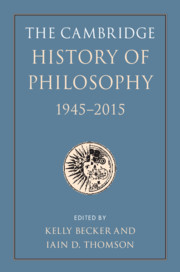Book contents
- The Cambridge History of Philosophy, 1945–2015
- The Cambridge History of Philosophy, 1945–2015
- Copyright page
- Contents
- Contributors
- Preface and Acknowledgments
- Introduction
- Part I Analytic Philosophy
- Part II Continental Philosophy
- Part III Bridge Builders, Border Crossers, Synthesizers, and Comparative Philosophy
- Section Eight Bridge Builders, Border Crossers, Synthesizers
- 42 Rethinking the Analytic/Continental Divide
- 43 Phenomenology and Ordinary Language Philosophy
- 44 Phenomenology Meets Philosophy of Mind and Language
- 45 The Impact of Pragmatism
- 46 Unruly Readers, Unruly Words
- 47 Anglo-American Existential Phenomenology
- 48 A Conceptual Genealogy of the Pittsburgh School
- Section Nine Comparative Philosophy
- Part IV Epilogue: On the Philosophy of the History of Philosophy
- References
- Index
45 - The Impact of Pragmatism
from Section Eight - Bridge Builders, Border Crossers, Synthesizers
Published online by Cambridge University Press: 08 November 2019
- The Cambridge History of Philosophy, 1945–2015
- The Cambridge History of Philosophy, 1945–2015
- Copyright page
- Contents
- Contributors
- Preface and Acknowledgments
- Introduction
- Part I Analytic Philosophy
- Part II Continental Philosophy
- Part III Bridge Builders, Border Crossers, Synthesizers, and Comparative Philosophy
- Section Eight Bridge Builders, Border Crossers, Synthesizers
- 42 Rethinking the Analytic/Continental Divide
- 43 Phenomenology and Ordinary Language Philosophy
- 44 Phenomenology Meets Philosophy of Mind and Language
- 45 The Impact of Pragmatism
- 46 Unruly Readers, Unruly Words
- 47 Anglo-American Existential Phenomenology
- 48 A Conceptual Genealogy of the Pittsburgh School
- Section Nine Comparative Philosophy
- Part IV Epilogue: On the Philosophy of the History of Philosophy
- References
- Index
Summary
American pragmatism was born in Cambridge, Massachusetts in the late 1860s in a reading group called The Metaphysical Club.1 Charles S. Peirce, William James, and Oliver Wendell Holmes Jr. were amongst its members. Each of these classical pragmatists has had an enduring effect not just on how the “Western” tradition of philosophy unfolded, but also on other distinct disciplines. Peirce, for instance, is considered the founder of the subject of semiotics, and his diagrammatic or iconic formal logic is now being studied as a tool for artificial intelligence and also as a freestanding competitor to the algebraic system Frege developed independently at the same time. James is still read in psychology for his fundamental ideas about the plasticity of the mind and for the richness of his insights about felt experience. His Varieties of Religious Experience continues to be an important text for those thinking about the value of religion. Holmes went on to be one of America’s most important legal theorists and Supreme Court justices, leaving indelible marks on the American legal books. The second wave of pragmatists, which included John Dewey, C. I. Lewis, and George Herbert Mead, also had wide-ranging and long-lasting impact – Dewey, for instance, in educational theory and Confucian philosophy; Lewis in logic; and Mead in sociology.
- Type
- Chapter
- Information
- The Cambridge History of Philosophy, 1945–2015 , pp. 624 - 633Publisher: Cambridge University PressPrint publication year: 2019



